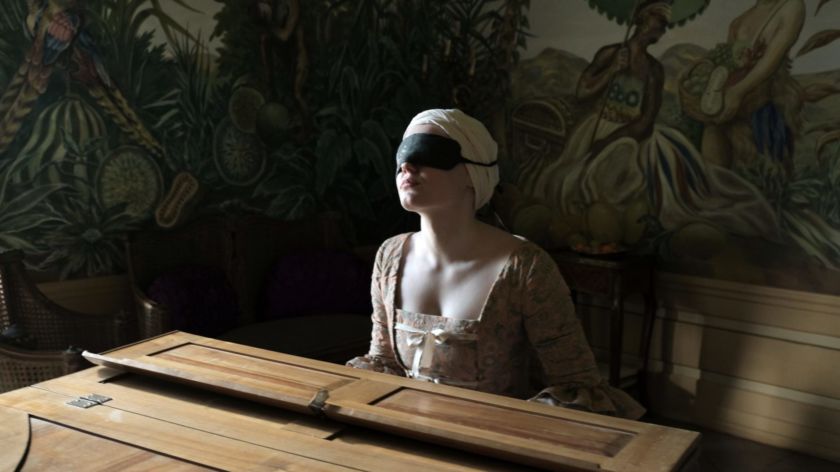-
 Still from the movie Mademoiselle Paradis.
Still from the movie Mademoiselle Paradis.
Winter days are short and the pandemic is keeping us indoors more than usual. A lack of daylight lurks, which can affect your mood and productivity. Here are five tips to help you stay healthy.
#1. Create a regular day and night rhythm
‘I know that it’s a very unpopular message as it sounds so boring’, says Gerard Kerkhof. ‘But it really helps to go to bed and wake up at the same time every day.’ Because, explains the Amsterdam Professor Emeritus in Psychophysiology who specialises in sleep and wake cycles: people with a regular day and night rhythm perform better during the day. This is especially true if you’re a night owl, if you have trouble getting out of bed in the morning, or if you tend to suffer from the winter blues.
This is confirmed by epidemiological research. People whose sleep- wake cycle is chronically disturbed are more at risk of developing depression and psychosis. They can even die younger because of heart problems, as concluded among others by a team of Maastricht researchers in April of this year. And a 2019 overview study in the Trends in Cancer journal showed that people who work nightshifts are more at risk of contracting hormone- related forms of cancer.
#2. Don’t stay up all night to study for an exam
Staying up all night to study may seem perfectly normal to some students, but it’s certainly not good for your performance, argues Kerkhof. ‘You wake up feeling hung-over and probably dissatisfied with what you actually learned during the night. Your body needs the night to recover, not to be active.’ It is better to go to bed on time and get up an hour earlier the next day. Preferably when it’s already light outside – if this isn’t possible, you can always use a daylight lamp. Or drink some strong coffee; it works best in the morning.
#3. Buy bright lamps or a wake-up light
A CBS study revealed that 20% of Dutch people suffer from sleep problems. The fact that so many of us have a distorted day and night rhythm is partially due to the lack of natural light, says Kerkhof. During the day, we spend most of our time indoors, where it is often darker than outside, while our evenings are often too light due to artificial light from street lights and buildings. 99% of the European population suffers from light pollution, as apparent from a 2016 study in Science Advances.
Melatonin acts as a kind of pacemaker for our body
‘Too little contrast between the light and dark moments of the day is often associated with a weak day and night rhythm’, says Kerkhof. ‘In other words: it disrupts our biological clock.’ This is how it works: our eyes contain special sensory cells that are sensitive to the amount of blue light – precisely the shade of blue that occurs most in daylight. The more blue light, the stronger the signal to what is known as the suprachiasmatic nucleus (SCN) in the middle of our brain. The SCN is in turn connected to the pineal gland, which produces melatonin. Melatonin acts as a kind of pacemaker for various processes in our body that have a day and night rhythm, such as sleep.
If you are exposed to too little daylight, you can compensate by installing special daylight lamps indoors, explains Kerkhof. These lamps approximate to some extent the brightness of the sun. ‘Put them in dark corners, and use a timer to create a predictable day and night rhythm.’ The next step is to avoid screens late at night, and make sure that your bedroom is actually dark. You can also use a wake-up light to help you be more alert in the morning.
#4. Be careful with melatonin (and sleeping pills)
Is it a good idea to take a few melatonin pills before going to bed? After all, melatonin makes you sleepy – the melatonin level in our blood rises sharply between 9 p.m. and midnight. Scientists have not yet reached a consensus on the matter. Some studies show positive effects: it seems that melatonin can help people to fall asleep ten to twenty minutes earlier, and stay asleep a little longer. However, other studies show no beneficial and, in some cases, even adverse effects.
Sleeping pills offer no solution
Furthermore, melatonin can have side effects, for example in combination with other medicines. This is why the American College of Physicians doesn’t recommend these supplements for people with a sleep disorder – cognitive therapy is more effective. Kerkhof: ‘Melatonin pills probably only work well if you know very precisely your own melatonin levels, which vary from person to person. To determine these levels you need a medical laboratory setting, for example in a hospital.’ Sleeping pills also offer no solution, since they can lead to habituation, or even addiction.
#5. Winter blues? Move to the tropics
The closer people live to the tropics, the less they suffer from winter depression, as researchers discovered as early as the 1980s. The link to sunlight is quickly made. In the Ecuadorian capital of Quito – located nearly on the Equator – on 21 December, the day lasts 12 hours and 8 minutes. By contrast, the shortest day of the year in Nijmegen only offers 7 hours and 46 minutes of daylight – less than two thirds of that time. In other words, that sunny Christmas break on the Canary Islands may not be such a bad idea, after all; no daylight lamp can compete with that. And if that’s not an option: St. John’s wort can help alleviate winter depression – although you should be careful: it can affect the effectiveness of other medicines.





